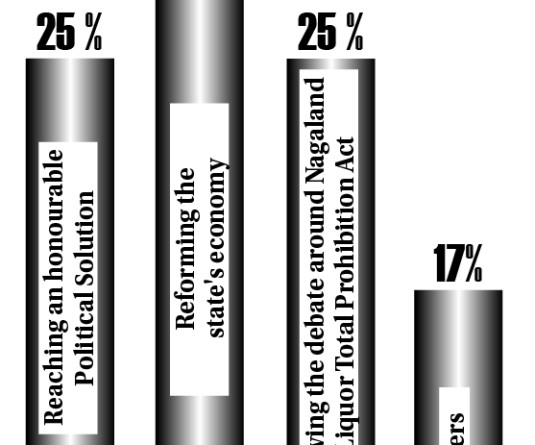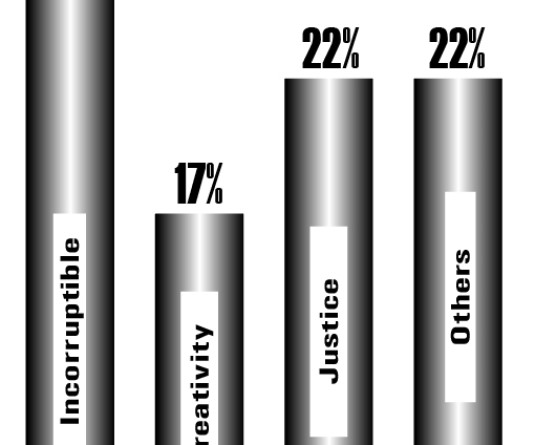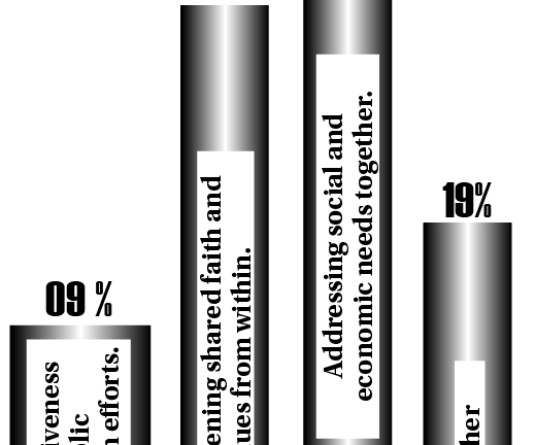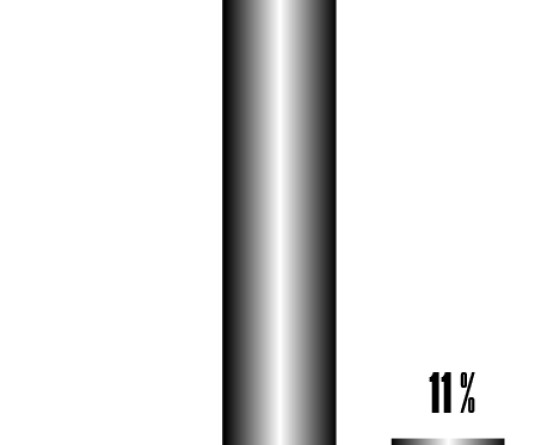Three children returning home after school in Nagaland. (Morung file photo)
• Education at the very core is a fundamental right of every human being. Having said that, not only government schools run by the state government, but also the private schools at large are taking away this right for education to all, in the pretext of giving a “quality education” comparing themselves with government schools. Sadly, education indeed has become family or individual run business establishments. Beginning from so called “admission fees” every single year which makes no sense to me. Why should a pupil who is already part of a particular School for years has to admit oneself over and over again every year? Is it not a robbery practiced in day light which is like an elephant in the room talked by none?? Why are the public silent about it? I did hear a firsthand explanation by one of the school proprietors, when raised a question of why it has been practiced by almost all the private schools, the answer goes something like this “we got to recover our investments made on the school infrastructure, vehicles so on and so forth”. But wait a minute, why should the public pay back your personal investment? Do you call that a service to the society? The beginning of education and schools in the Indian subcontinent by and large were by Christian missionaries some selling their properties back in their home land, coming into the third world nations like ours (back then) with their own selfless funds, blood, sweat and toil, never to return back home but to the extent of sacrificing their own lives in establishing schools and bringing formal education into this part of the world. Are we all not fruit of that selfless work, love and dedication? Now, we, talk about reclaiming our so called investments! The irony is that, these are done in the name of “serving the community”. It is like wolves in sheep clothing, devouring the middle and the lower middle class of our society. When greed and selfishness stand as a root for this educational system of ours, how one could possibly hope for a transformed society by and through education? The root itself is stealing, there by producing thieves in our society so to speak. Quality education is created and sustained 'not just' by infrastructure and advancement of study tools but being built upon Godly values, justice, honesty, selflessness, sacrifice so and so forth. May we have pure hands, pure heart and pure intentions for the welfare and bright future of the generations to come!
• The education system cannot be left entirely with politicians and bureaucrats. It cannot also be left entirely to teachers. There must be a synergy where politicians, bureaucrats and teachers must work together to improve education in Nagaland.
• A change of mindset is required. Even teachers must be more dedicated and should be willing to go to where ever they are transferred and not lobby with politicians for posting of their own choice.
• Policy makers should be those people who had been in the teaching profession from the grassroots level for at least 20 to 25 years, not the one who got a windfall by passing competitive exams, who has never seen a real classroom.
• Teachers must be dedicated. Most of the teachers are there out of employment and not because they want to become teachers. This is one of the biggest obstacles. Many teachers do not go to their place of appointment and instead send their proxy. This must be resolved by the department. We need dedicated people in the department who are willing to take tough decisions to clean up the department.
• Teachers should be paid their salary on time and must be respected.
• Key policy changes to improve education quality in Nagaland:
1. Optimise the communitization project - review performance matrics, re-align the objectives to demands of job markets, and strengthen accountability mechanisms.
2. Increase budget allocation for comprehensive school infrastructure development program. Ensure adequate seats are available at least up to 12 std in arts, sciences and commerce at all District level schools.
3. Encourage the state school board to create programs to define, enhance and ensure minimum reading and numeracy standards for each class/grade.
4. Upgrade Vocational Education programs to incorporate basic business, financial and marketing knowledge and communication skills as per demands of modern job market and to encourage entrepreneurship.
5. Facilitate ways to encourage people going into STEM fields to capitalise on the technological advancement of the 21st century
6. Establish a targeted annual production goal of at least 200 doctors and 1000 students in Engineering & IT related fields.
7. Subsidise courses at graduate and post-graduate levels to encourage academically driven students to pursue higher studies.
8. Facilitate establishment of skill based centres to improve employability of students after matriculation.
9. Continue to keep syllabus relevant to today's age and time
10. Teachers are for teaching the students but for all round development, parents must also engage in various educational activities and not put the onus only on the teachers. Parent teacher meeting must increase in the government schools and make it as meaningful as possible for all parties involved.
11. Equal emphasis on learning by practice along with theory, not just for the natural science subjects but also for other subjects like literature, social studies, math, language etc.
12. Maintain adequate and fair student-teacher ratio especially in private schools. If the ratio is fulfilled, the school should not be allowed to take in more students in that particular class, thereby maintaining quality time in teaching each student, and also reducing the stress of the teacher.
13. Mandatory special education in each school for students with special developmental and learning needs. If no special educator is available to employ then the school can sponsor a teacher for the same with a contract (service bond).
• The system needs to be cleaned up first. Lots of backdoor appointments and bogus positions need to be identified and cleared off. For quality education the system needs to be cleaned.
• Politicians must keep their hands away from Education department. Politicians have over the years been responsible for destroying the Education department because they keep on appointing their relatives, family members, villagers and political supports and their families into the education department. This has destroyed the department. No politician or bureaucrat worth their salt has had the will or the courage to clean up the system.
• To improve quality of education in Nagaland, the public school system must be strengthened by providing and enhancing infrastructure. Education must be made a priority in state policy. Also, classes 1 to 12 should be under the school education. Colleges should be barred from providing PU first year and second year and any school found violating this must be penalized according to law.
• Build infrastructure. Have trained and qualified teachers. Regulate the functioning of public and private schools. Invest more in Public schools.
• 1. Life Skills programs should be included in the school curriculum; 2. Less syllabus and more effective learning; 3. Education based on activities
• 1. Focus on Life Skills
2. Have programmes on Soft Skill Development
3. Balance of both Academics and Co-curricular activities
4. Take Conceptual Tests
5. Set a number of Conceptual Questions in Exams and not the obvious ones given at the end of each lesson in the textbooks
6. Have good practical rooms for Science subject
7. Stop giving assignments that are irrelevant and unnecessary
8. Have open forum discussions on the lesson right after its completion and not just copy pasting notes
9. Give space to students to share their views in class whilst maintaining classroom decorum and discipline
10. Update all the textbooks with the new facts added please
11. Class teachers should observe each student and ask the other subject teachers thoroughly on every student and keep a record. On academics, particular subject, personal aptitude, need of mental health help etc. (P.S. please pay Class Teachers a little extra)
• As a tutor, I have realised the following for quality education:
1. Before any lecture, we must let the students know why we are studying a particular topic. It's relevance, uses and it's resourcefulness in future.
2. Many students of the current generation do not take blame for their poor performances in exams. Hence, it is necessary to bring up responsible individuals. This can be checked by letting them evaluate themselves about their daily schedule, study hours etc.
3. Students bags are bigger and heavier. Perhaps it is their first step to demotivate studying...just a thought! Focusing in major papers that go along with higher classes can be more fruitful.
4. Many schools give importance to extra-curricular activities. No problem in that but having a USP (sports focused besides education, literary focused, entrepreneurship or paintings etc) can attract attention because we all have different pleasures and goals.
5. We need actual teachers who have the aspirations to become teachers. Many people are enrolling for B.Ed as the last option for jobs. There will be exceptional ones nevertheless, but many do teaching as jobs. We need sincere and dedicated teachers who build careers from it not jobs.
There are more, but for now, let’s give a thought to these points.
• It will be advisable to introduce only the necessary measures under different pilot project of the central government in the state education system as it gives extra tension and pressure to the work force of the department. It hampers the working structure and environment and makes it unable to focus in the main motive of providing quality education. Revival of the education system should be suitable to the area in which the institution is located.
• Nagaland government must be serious about education. If Nagaland is to grow and become self-reliant and prosperous, we need a dynamic education system with vision.
• Blanket policies may not always work. As such context based studies are required before any policy is implemented. The present FYUGP system finds caught between Core subjects and Skills courses and many students are finding it difficult to strike a balance. Policies pertaining to quality measures should look at bridging the quality and delivery gap. Presently, Govt needs a very well envisaged and articulated infrastructural policies based on actual needs, as lack of proper infrastructure hampers the teaching-learning process. There is also something about 'things' being done “in the interest of public service” but does not really rhyme with the spirit with which it is done, that, many a time it is not in the best interest of the students or the institution. Many students from economically weaker section suffer a lot. Timely disbursement of scholarships say half-hour yearly disbursement will really help a lot.
1) First and foremost the student teacher ratio should be addressed – Until this day, many schools are found to be ignorant about this issue which in contrast is a major issue that will have last long impact on the lives of the beneficiary (students). Overcrowding of classrooms should be strictly discouraged for betterment and best results of both the educator as well as the learners.
2) Recommendation of textbooks based on relevance and quality of its contents – In this case, the policy makers may suggest textbooks (options provided) so that schools can choose from the given options based on the need and the economic conditions of its student community instead of the liberty given to randomly use any book (specially in regard to the primary & middle grades)
3) Challenge educational institutions/providers to maintain a certain benchmark for each academic session – This can be done so that every education providers may be accountable towards the growth and development of its students and ensuring that quality education is being provided. (Underperforming schools inclusive of both primary as well as the middle sections too should be checked on instead of just relying on the HSLC/HSSLC results.)
4) Importance to be given on skill based subject(s) – With the world moving on at such a competitive and fast pace, policy makers should emphasize that schools are giving equal importance to skill based subject(s) as much as the so called main subjects.
• The government needs to show intent and clear plan of action to improve the quality of education. There has been too much meddling of political interests in the education department with the appointment of employees through backdoor channel. This is the reason why the public has lost trust in the education department. The government must take measures to win public trust and confidence by ensuring that there is no more backdoor appointment and no more political transfers.
• Take swift action on proxy teachers and backdoor appointments. Clean up the system immediately as a first step.
• Here are some suggestions:
1. Streamline Transfer policy: Transfer of each teacher must be done with a replacement. The department should come out with clear modalities on transfer policy.
2. Filling the vacancies arising out of retirement: The department must spend some time to chart out numbers of expected retirement (say, in the next academic year) and come out with measures/plans to immediately fill those vacancies (following the retirement of the staff).
3. One size doesn't fit all: Firms contracted to supply requirements of the schools in the state must be based district wise (or provide contract only to those firms that has its branch opened in the respective districts). The case of uniform distribution is very absurd, as readymade uniform supplied to the schools do not fit all. Materials/infrastructure/teaching aid supplies must be based on the need and demand, which requires data from the respective schools, not the illogical supplies of top down approach.
4. Development projects: Painting the school with new colors do not define quality education. Real education is equipping the students, sharpening them mentally and skilling them. Every development projects must equally focus on developing the students, not only the infrastructure.
5. Relook into student-teacher ratio especially in towns and cities (urban areas): If the department has a genuine intention to provide quality education, each school must be considered important be it in village or town or cities. The department should check the number of teachers posted in each schools and students enrolled to ensure equality.
6. Undertake only properly researched Logical Initiatives: The so called rationalization process initiated by the department has been the most irrational exercise. If the process was true rationalization, then the issue of retaining the rationalized transfers would not arise.
7. More (and only) of academic interests rather than political interest/interference: The department need to come out with strict policies where there will be only academic interests as measures for growth. This must be made in such a way that no one can interfere in this policy, except the department governing body, that also with all transparency.
8. Working/Teaching with passion: Staff/Teacher must work/teach with passion, not out of compulsion due to department initiatives such as biometrics or any other measures started by concerned department.
9. Ensure Basic necessity in school including placement of non teaching staff: Ensure adequate facilities (minimum basic requirements - separate toilets for girls and boys and teachers, classroom, school hall, water, science laboratory, etc) and sufficient staff must be put in place in each school. But in some schools only AHM will manage all the administrative works, therefore, it is not it is mandatory that both HM and AHM must be placed in that school. Such mechanism will require a proper first hand survey on staff placement in the schools.
10. Update the Department statistics regularly/monthly: Details of the school staff, requirement, etc, must be updated regularly. Those databases should be only in one system/software. The department can develop software which can be made available with 2 nodal officers (one each at Directorate and Secretariat).
11. Ensuring Community Participation: The department must invest in sensitising communities to generate/develop ownership of the school in their village/jurisdiction.
• 1. Foundation of primary section should be given outmost importance. Highly qualified teachers are required for this. 2. Exposure of teachers. 3. Selection & Promotion of teachers should be purely based on merits. 4. Of course infrastructure.






